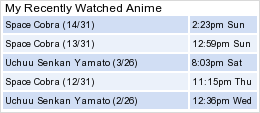While many businesses go abroad to take advantage of low production costs, Yutaka Yamamoto is looking overseas for inspiration to jump-start what had once been considered an infallible Japanese product: anime.
The anime creator, who likens his trade to manufacturing, says he seeks to develop an equal standing with partners overseas.
"The bubble has burst" in Japan for the anime industry, Yamamoto said.
He said the reluctance of the anime industry to change its business practices has driven down wages, drained the creative spirit and consequently turned off many fans.
"It is becoming the norm to order some of our work to anime productions in China and South Korea. Not because we want to suppress our personnel costs, but rather because we are unable to find enough people to work (in Japan)," Yamamoto, 36, said.
He said that while the skills and quality of work produced in those countries are improving, "many of the works appear to have been influenced strongly by Japanese designs."
"I'm hoping that something that is typical of that country will come out," Yamamoto said.
Yamamoto's expectations come from watching the domestic industry become glutted with similar anime styles.
He joined an anime production company after graduating from college, and he helped to create such popular anime hits as "Suzumiya Haruhi no Yuutsu" (The Melancholy of Haruhi Suzumiya) and "Lucky Star."
Three years ago, he started his own business, which today employs about 10 people.
But while he has found the work of his calling, he said he is facing a "block."
"There was a time when people were under the impression that anime makes money, and that anime is a culture that can gain respect worldwide," Yamamoto said. "But at the same time, the priority has been on quantity."
Working conditions have remained dire, and the industry has been hit by a chronic shortage of creators.
The recession exacerbated the animators' woes as sponsorships have shriveled since around 2007. With television broadcasters cutting their budgets, the anime industry has tried to make up for lost sales through DVD productions. But even that strategy has been undermined by illegal broadcasts on the Internet.
Another concern for the industry is a possible shrinking fan base. Estimates put the population of die-hard anime fans at around 150,000. But Yamamoto suspects the number now falls short of 100,000.
Part of the reason, Yamamoto said, is that producers, including himself, devoted too much of their energies in creating cutesy "moe" (budding)-type characters in hopes of making sure-sell products in an already small market.
"Although the otaku (geek) market is said to be a robust one, even the otaku are not immune to Japan's economic doldrums," Yamamoto said.
Yamamoto is now trying to think outside of the box.
Last year, he directed "Watashi-no Yasashikunai Senpai" (My mean senior colleague), a romance-comedy featuring popular teenage actress Umika Kawashima and comedian Satoshi Kanada.
Yamamoto said the experience reminded him of the importance of human interface.
"In anime, the division of labor has become the norm. And in some cases, one never meets other staff involved in the same project. That may be one reason for the current stagnant situation," Yamamoto said.
Yamamoto said his new way of thinking has helped to open up business opportunities. He joined hands with Good Smile Co., an anime character figurine maker, to create an anime DVD packaged as a promotional tool for an anime figurine.
His latest anime series, "Fractale," to be aired from Jan. 13 on Fuji Television Network Inc., will target non-anime fans and one-time fans who have shifted away from the genre.
"The anime industry is said to have become introverted. But our business is about providing something fun and exciting to people. I decided to stop being inward-looking," Yamamoto said.
Yamamoto said he hopes to create an interface with prospective fans overseas through such measures as adding subtitles to his works.
Nevertheless, he believes simply selling anime abroad is not enough. He said it is crucial for the domestic market to regain its vibrancy that will attract people overseas.
"I hope that we can develop an equal relationship with creators overseas, and not simply subcontract work. For that, we need to continue creating works that other people will be interested in," Yamamoto said.
To put this into context, he's mentioned a few times before that if Fractale ends up failing, he'll be quitting anime.
Personally, I think the industry is learning, even if they're slow or aren't getting it right or are being forced into it out of desperation. Things like Anime no Chikara show that they're trying and the expansion and continuing popularity of noitaminA is a good sign. There was also definitely a noticeable trend towards movies and OVAs in 2010.


 "
"


